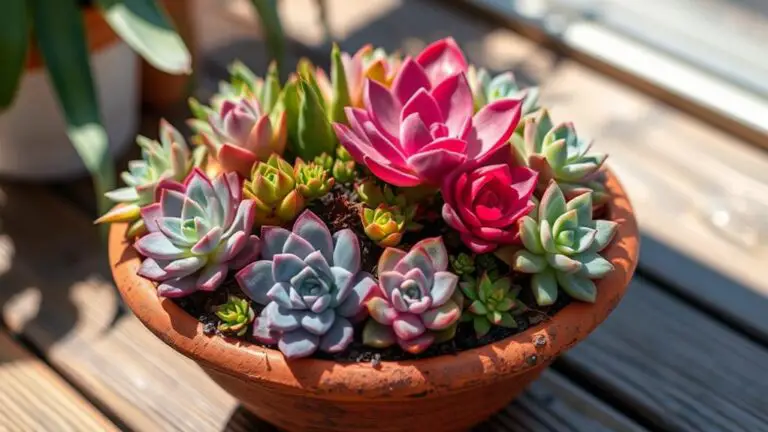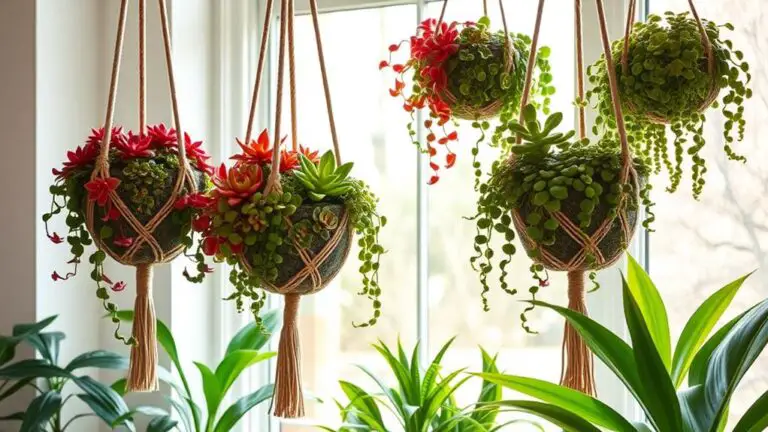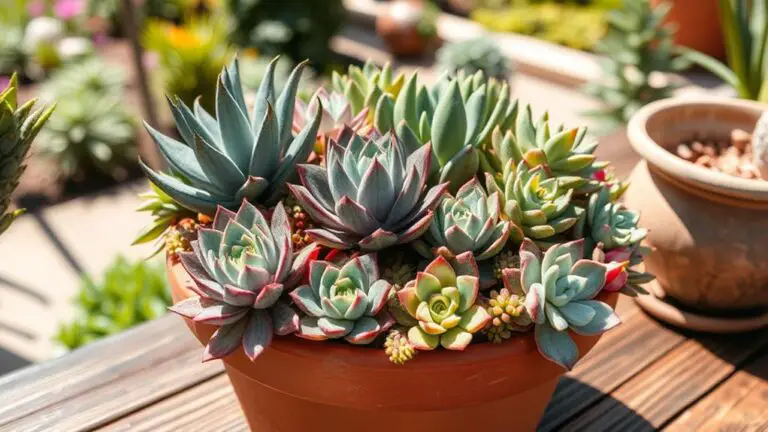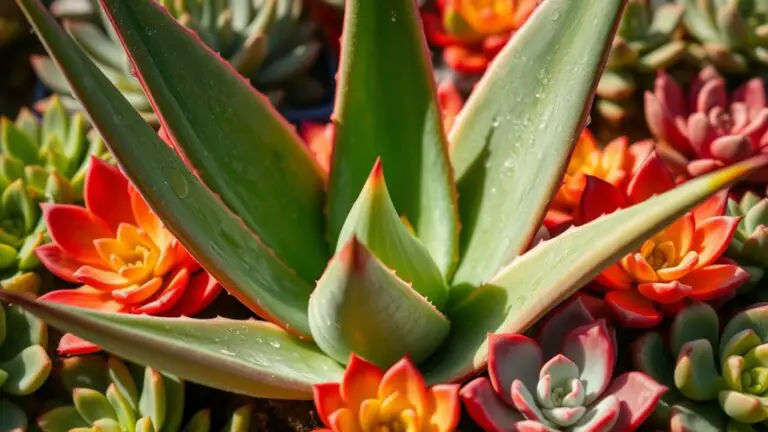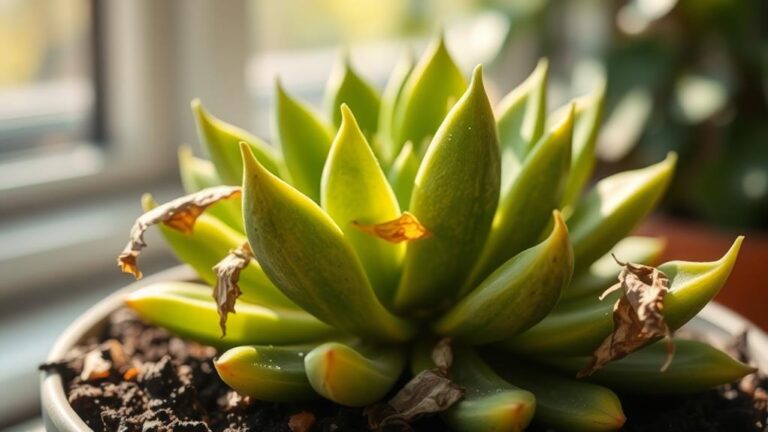Top 5 Good Bugs for Your Garden
When you're planning your garden, you might not think about the insects that can actually benefit your plants. Ladybugs, for instance, do more than just look charming—they're aphid-eating machines. Green lacewings, with their hungry larvae, are another ally you shouldn't overlook. Don't forget about praying mantises; they're formidable predators of various pests. Bumblebees, essential for pollination, play a vital role in your garden's productivity. And let's not ignore dragonflies; they help keep mosquito populations in check. Want to know how to attract these beneficial bugs and create a thriving garden ecosystem? There's more to uncover.
Ladybugs
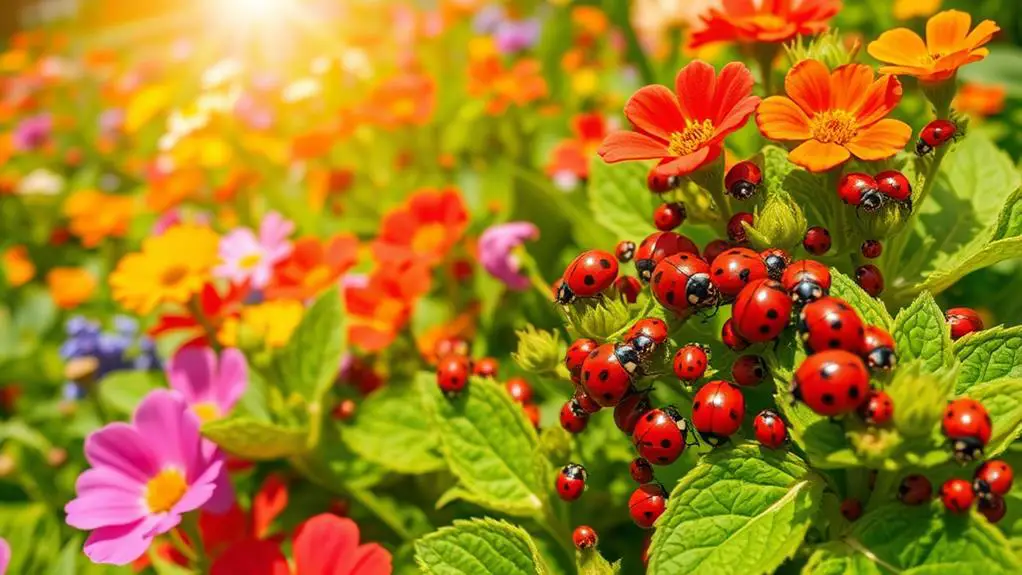
Ladybugs, also known as ladybird beetles, are some of the best allies you can have in your garden. These beneficial bugs are highly effective predators of aphids, consuming up to 50 aphids per day during their larval stage. By targeting aphids, ladybugs help control one of the most common garden pests, keeping your plants healthy and vibrant.
In addition to aphids, ladybugs also help manage other pests like mites and mealybugs. Their role in pest management makes them valuable allies for any gardener. These predatory beetles are most active in the warmer months of spring and summer. When temperatures drop, they hibernate in clusters to survive the cold.
If you want to attract ladybugs to your garden, plant native flowering plants. These plants provide nectar and pollen that ladybugs enjoy.
Also, avoid using chemical pesticides, as they can harm ladybugs and other beneficial insects. By creating a welcoming environment, you can encourage these valuable allies to take up residence in your garden.
With ladybugs patrolling your garden, you can reduce the need for chemical interventions and enjoy a more natural, balanced ecosystem. Your garden will thank you!
Green Lacewings
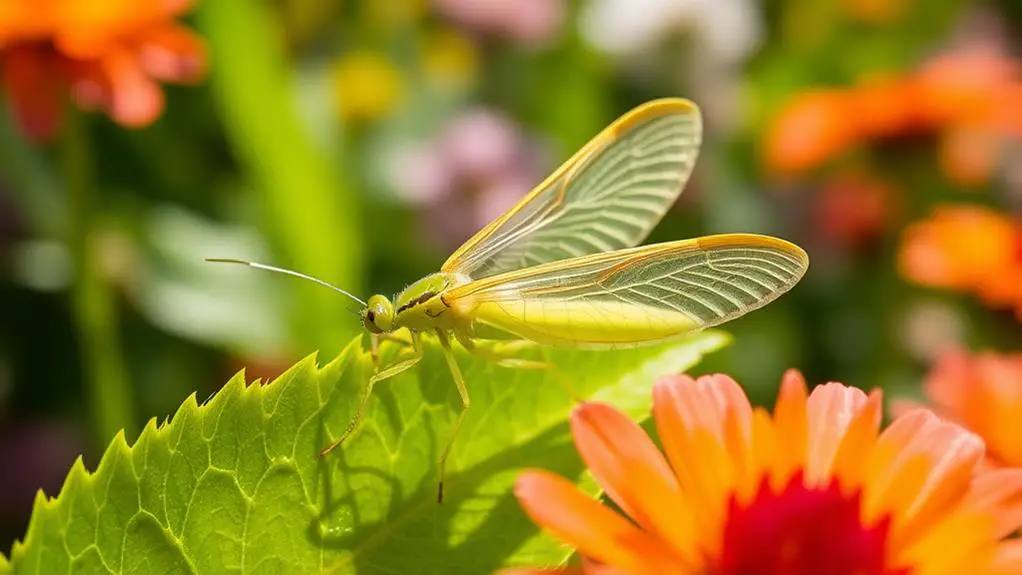
Green lacewings, with their delicate, translucent wings and striking green bodies, are another fantastic addition to your garden's natural pest control team. These beneficial insects are particularly effective against pests such as aphids. The larvae of green lacewings are voracious predators that can consume up to 200 aphids per week, providing excellent natural pest control.
Adult green lacewings mainly feed on nectar and pollen. While they're searching for food, they help pollinate various plants in your garden. This dual role makes them invaluable. To attract these helpful insects, plant fragrant flowers, which will draw them to your garden and enhance their effectiveness in controlling pests.
Green lacewing eggs are laid on slender stalks, which protect them from predators and guarantee the larvae can immediately find food upon hatching. Their presence in your garden is a sign of a healthy ecosystem. They thrive in environments rich in biodiversity and low in chemical pesticides.
Encouraging the presence of green lacewings in your garden supports a balanced, healthy ecosystem. You'll reduce the need for chemical pesticides, promoting a safer and more sustainable gardening practice.
Praying Mantises
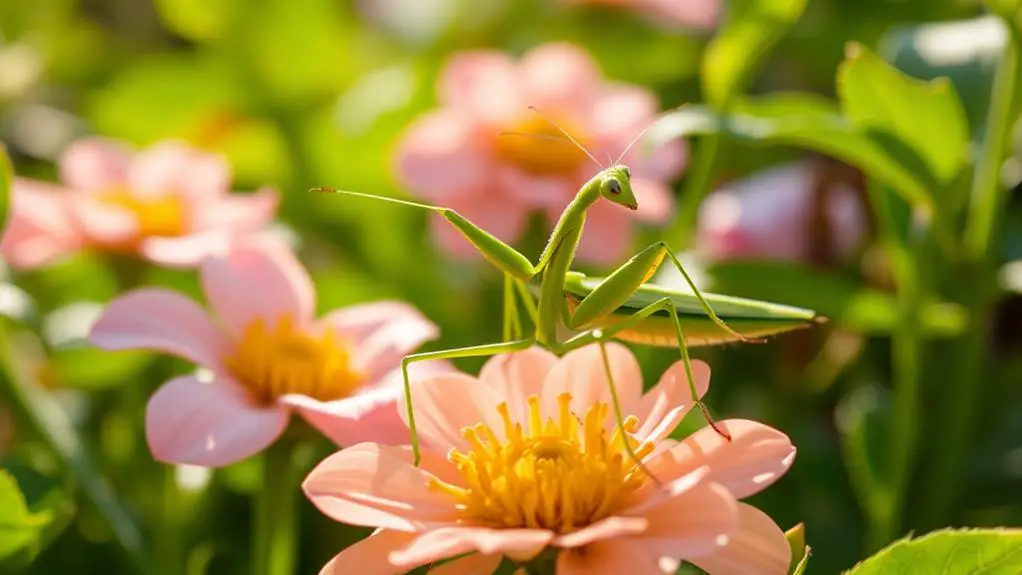
Praying mantises are some of the most effective predators you can introduce to your garden. They're fierce predators that hunt a variety of common garden pests like aphids, flies, and caterpillars. By adding praying mantises to your vegetable garden, you'll benefit from natural pest control, reducing the need for chemical pesticides.
These beneficial insects are most active from spring to early autumn, aligning perfectly with the growing season.
One of the most fascinating aspects of praying mantises is their unique appearance. With their triangular heads and elongated bodies, they attract the interest of gardeners and nature enthusiasts alike. Beyond their looks, these insects play a vital role in pest management.
A single praying mantis can consume a significant number of pests throughout its adult phase, keeping your plants safe and healthy.
You'll often find praying mantises in raised vegetable gardens and areas with abundant plants. They provide natural pest control right where it's most needed.
By maintaining a diverse food supply for them, you can guarantee these beneficial insects thrive and continue to protect your garden.
Bumblebees
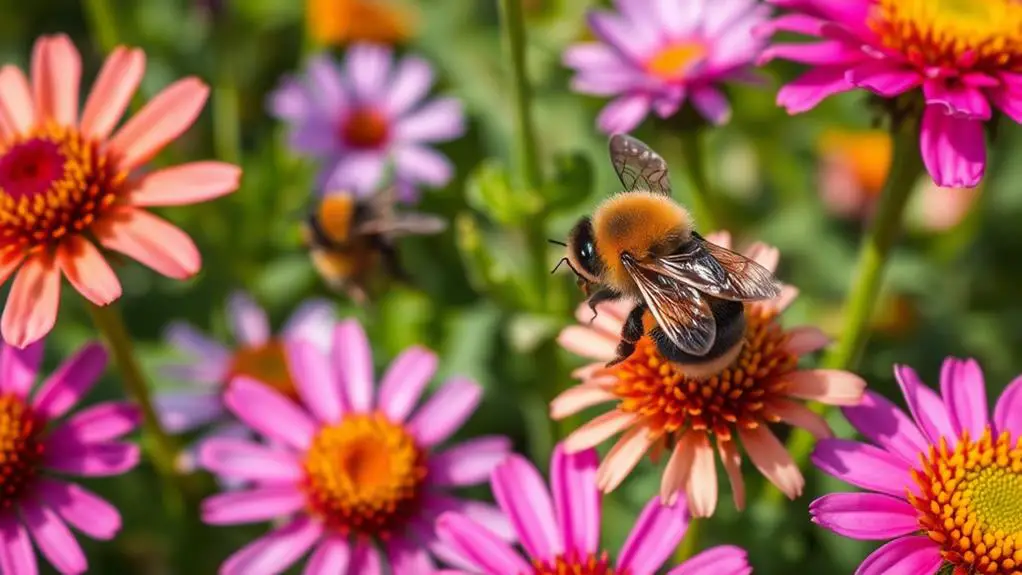
While praying mantises help keep pests at bay, another invaluable ally for your garden is the bumblebee. Bumblebees are key pollinators, essential for fertilizing over 70 crops like strawberries, blueberries, and tomatoes. This greatly boosts your fruit and vegetable yields, making them an essential part of any garden.
Bumblebees are most active during the spring and summer when flowering plants are in full bloom. Planting native flowering plants can attract these important pollinators to your garden, enhancing your local ecosystem's health. Unlike honeybees, bumblebees can thermoregulate, allowing them to forage in cooler temperatures. This means they can start pollinating earlier in the season, giving your garden an early boost.
To support bumblebees, it's important to avoid using pesticides, as these chemicals can harm their health and survival. By creating a pesticide-free environment, you're encouraging a thriving bumblebee population, which in turn benefits your garden.
| Benefit | Details |
|---|---|
| Pollination | Essential for over 70 crops, including fruits and vegetables |
| Activity Period | Most active during spring and summer |
| Attraction to Natives | Drawn to native flowering plants, boosting local ecosystem |
Dragonflies
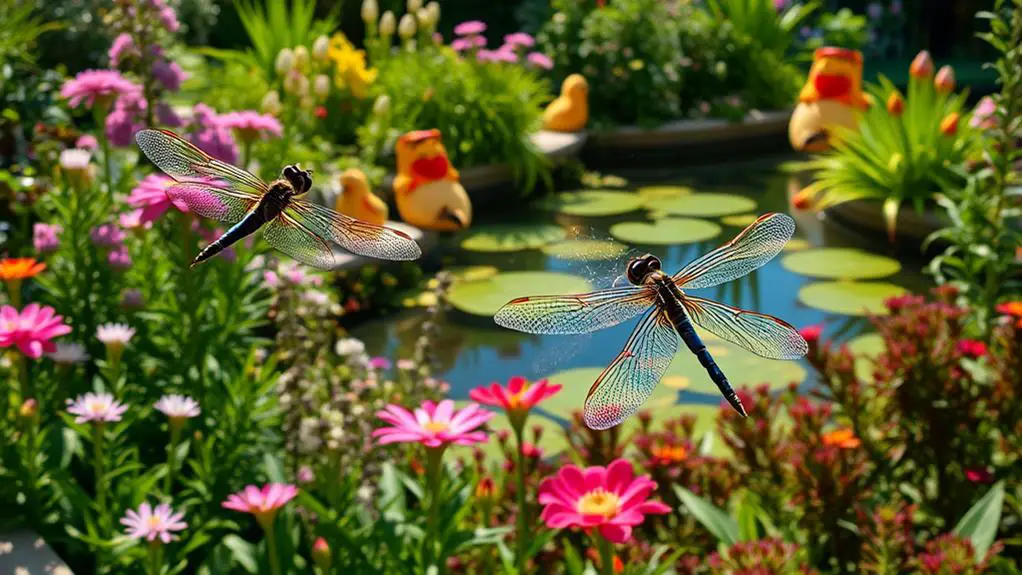
Dragonflies are exceptional allies in your garden, acting as voracious predators that help control pest populations. These good bugs are amazing at consuming mosquitoes and other flying insects, making your outdoor space more enjoyable. They can eat hundreds of mosquitoes in a single day, greatly reducing the mosquito population and other pests that can disrupt your garden's ecosystem.
Dragonflies are most active during the warm months, especially near bodies of water where they lay their eggs and hunt for prey. Their presence in your garden indicates a healthy ecosystem. They require clean water sources and abundant prey to thrive. When you see dragonflies, you know your garden is in good shape.
Starting as aquatic larvae, dragonflies undergo a fascinating life cycle. They begin in the water, eating organic matter and small pests, then transform into adult predators that patrol the sky.
This unique cycle means they control pests both in the water and on land, providing food for their young and maintaining balance.
Embrace dragonflies in your garden. They're not just beautiful to watch; they're also hard-working, natural pest controllers that contribute greatly to a healthy and thriving garden ecosystem.
Frequently Asked Questions
What Are the Best Bugs for Your Garden?
You should welcome ladybugs, green lacewings, praying mantises, hoverflies, and ground beetles into your garden. They naturally control pests, promote pollination, and maintain ecological balance, making your garden healthier and more productive.
Should I Add Bugs to My Garden?
Absolutely, you should add bugs to your garden. Beneficial insects enhance pollination, control pests naturally, and boost yields. Just make certain you avoid chemical pesticides and plant diverse flora to create a welcoming habitat for them.
What Garden Insect Helps in Pest Control?
Ladybugs are fantastic for pest control. Their larvae can eat up to 40 aphids per hour. Green lacewing larvae and praying mantises also help by consuming various pests. Ground beetles and parasitic wasps are great additions too.
What Bug Is Bad for Your Garden?
You should watch out for aphids, spider mites, whiteflies, Japanese beetles, and cutworms. They damage plants by feeding on them, spreading diseases, and causing structural harm. Controlling them is essential for a healthy garden.
Conclusion
You can make your garden thrive by welcoming these five beneficial insects. Ladybugs, green lacewings, praying mantises, bumblebees, and dragonflies work wonders in keeping pests in check and plants healthy. Just avoid using pesticides and plant some native flowers. You'll soon see a more balanced and vibrant garden. Don't worry, you've got this! With a bit of effort, your garden will be a haven for these helpful bugs and a joy for you to enjoy.


